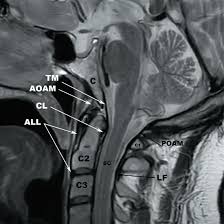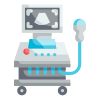Book an Appointment
MRI Screening CV Junction
Medifyhome has collaborated with the best pathology laboratories that are NABL and NABH certified and follow ISO safety guidelines to provide the best MRI Screening CV Junction at an affordable price for needy individuals. Cervicothoracic Junction is a transitional area in the spine, which belongs to the cervical spine as well as Cervical spine. This area is crucial for protecting the spinal cord and nerves besides providing support to the head as well as helping in any movement. Because CV joints have a compound structure, it is vulnerable to diseases such as degenerative diseases, injuries by traumas, infections, or birth defects.
This imaging method creates additional value in the diagnostic imaging of various forms of disease such as nerve compression syndromes, spinal cord pathology, disc herniations, degenerative disc diseases, tumours etc. Screening using MRI provides healthcare givers with a clear view of bone and soft tissue around the cervicothoracic junction, diagnose the severity of the problem and advise on the appropriate line of action. To schedule an appointment for MRI Screening CV Junction, simply contact Medifyhome or call our customer care at +919100907036 or +919100907622 for more details and queries.
What is MRI Screening of the CV Junction?
MRI Screening of the Cervicothoracic Junction is the use of MRI to assess the junction between the cervical spine and the upper thoracic spine. This area is the cervicothoracic junction; it is a zone of the spine involving the seventh cervical vertebra and primary thoracic vertebra. Cervicothoracic junction MRI is a form of imaging test that uses MRI to screen this area where both the bones and soft tissues can be observed. This includes detailed imaging of:
- The SMR coordinates also leave clear traces in such bony formations as vertebrae (bones of the spine).
- Intervertebral discs that provide some space between them in form of compressible pads referred to as discs.
- Spinal cord
- Nerves
- Blood vessels
- Tissues such as muscles and ligaments The muscular system and the connective tissue system
The MRI generator uses a magnetic field with radio waves to produce a clear picture of the body tissues and hence identifies any irregularities in the cervicothoracic area. MRI is superior to x-ray or CT scan because it does not use radiation which can harm the patient, to diagnose the spinal cord, nerve roots, and soft tissues. This type of MRI screening is typically recommended for patients experiencing symptoms such as:
- Neck or upper back pain
- Pain, numbness or weakness which radiates to the arms and shoulders
- They include; A suspected spinal cord compression
- Post-trauma evaluation
- Identification of a malignant cell, an infection, or at birth something has gone wrong.
Indications for MRI Screening of the CV Junction
MRI scanning of the Cervicothoracic (CV) Junction serves as a functional examination for patients with cervical and upper thoracic spinal related symptoms or diseases. Some of the common indications for MRI screening of the CV Junction include:
- Neck or Upper Back Pain
Pain in the neck and upper back that becomes constant or intense, or in areas towards the shoulders, arms or chest may be a sign of trouble at the CV Junction.
MRI allows determining the cause of pain, it may be degenerative disc diseases, disc herniation or spinal stenosis.
- Arm Pain or Numbness in Arm назна
Burning or tingling sensations of the arms or hands or such symptoms when beginning at the neck or other upper back area may indicate that there is nerve compression or nerve irritation at the CV junction.
MRI can diagnose cases such as nerve root impingement, disc protrusion, or spinal cord impingement.
- Disorder, Disease, Trauma or Injury of the Cervicothoracic Area
After injury, an accident, a fall or a whiplash, a sprain, a twist or any sort of athletic trauma MRI screening should be performed to check for possible fracture, ligament sprain or strain or the condition of the spinal cord in the CV Junction.
It assists to give a measure of the severity of the injury done to the vertebral and para vertebral tissues.
- Possible spinal cord compression
Signs of spinal cord compression include weakness, loss of coordination, difficulty in walking, and bowel or bladder changes.
MRI is the best imaging modality in determining the spinal canal compromise, pinpointing where the pressure on the spinal cord is most acute.
- Osteoarthritis of the spine or disc protrusion.
MRI is done to assess the changes in the disc that may be degenerative, and they may bring pain, stiffness, or neurological manifestations in the cervical and upper thoracic spine.
Procedures such as disc bulging, disc herniation or degenerative disc diseases can be analyzed to know the most suitable action to be taken.
Benefits of MRI Screening of the CV Junction
Several benefits derive from this study as it attempts to explain the right approach to MR imaging screening of the Cervicothoracic (CV) Junction region for the cervical and the upper thoracic vertebrae. As a noninvasive diagnostic tool, CT is of great use when assessing the area of the cervicothoracic junction, where the cervical spine – the neck – joins the upper thoracic spine. Some of the key benefits of MRI screening for the CV Junction include:
- Non invasive and no radiation test
MRI does not use ionizing radiation as can be seen in X-rays or Computerized tomography scans, and therefore can be used frequently in patients who require frequent imaging.
It entails no use of surgery or other invasive diagnostic procedures and at the same time is not a risky process.
- Clear, Close up pictures
MRI offers detailed and clear images of tissues and imaging of the bones of the cervicothoracic junction. It can clearly view the cross sectional area of the spinal cord, the vertebrae, the intervertebral discs, the nerves, the muscles, and ligaments in this area.
The high-resolution imaging capability enhances the ability to diagnose myriad spinal disorders that range from degenerative processes to congenital anomalies and neoplasm.
- Recognition of Soft Tissue & Nerve Pathologies
MRI surpasses the standard X-ray scans, CT scans in defining the soft tissues for instance muscles, ligaments and nerves. It is therefore very useful for diagnosing nerve compression, spinal canal pathology, disc protrusions and inflammation.
MRI can be especially valuable when used to diagnose radiculopathy and myelopathy, which are often not distinguishable with other tests.
- Dilemma with Early Detection of Spinal Conditions
Spinal stenosis, degenerative disc disease, and disc herniations can be diagnosed through MRI at early stages even before aggravation occurs. That way, conservative practices like physical therapy, medicine, or endoscopic procedures might offer relief and prevent those invasive ones, like surgery.
It also has value in determining the severity and distribution of problems in order to establish more precise therapy.
- Evaluation of Spinal Cord Nerves and Reflexes
MRI is particularly useful when diagnosing disorders of the spinal cord since it creates detailed images of the spinal canal and thus would reveal spinal cord compression from herniated discs, tumors or trauma.
This is very important in a way since it is desirable to avoid the long standing consequences including paralysis, numbness, or even motor weakness among the patients.
- Test Type: MRI Screening CV Junction
- Preparation:
- Wear a loose-fitting cloth
- Fasting not required
- Carry Your ID Proof
- Prescription is mandatory for patients with a doctor’s sign, stamp, with DMC/HMC number; as per PC-PNDT Act
- Reports Time: With in 4-6 hours
- Test Price: Rs.4000
How to book an appointment for a MRI Screening CV Junction?
To schedule an appointment for MRI Screening CV Junction, simply contact Medifyhome or call our customer care at +919100907036 or +919100907622 for more details and queries.
What is an MRI of the CV Junction?
MRI of the CV Junction is a detailed scan at the junction of the cervical spine and the upper thoracic spine. It provides very detailed images of the bones, discs, spinal cord, nerves, muscles, and ligaments of this critical region that are helpful in diagnosing and assessing many conditions affecting the spine.
Why is an MRI of the CV Junction required?
An MRI of the CV Junction is required when a patient complains of persistent neck or upper back pain, radiating arm pain, numbness, weakness, or difficulty moving the neck. It helps diagnose nerve compression, disc herniations, spinal cord compression, tumors, infections, and congenital spinal abnormalities.
How does an MRI work?
MRI uses strong magnetic fields and radio waves to create images of the body’s internal structures. The magnetic field aligns the atoms in the body, and radio waves produce signals that are turned into images by a computer. This process enables the visualization of both soft tissues and bones without the use of radiation.
Is MRI of the CV Junction safe?
Yes, MRI is generally considered safe for most people. It does not have ionizing radiation and hence is much safer compared to the case with CT scans or X-rays. However, those people carrying particular metal implants, pacemakers, or other related medical equipment need to either avoid the MRI procedure or take particular precautions.
Does MRI of the CV Junction hurt?
The MRI procedure itself is painless. However, the patient must remain still during the scan, which can sometimes be uncomfortable. Some people may experience anxiety or claustrophobia because of the enclosed nature of the MRI machine.
How long does an MRI of the CV Junction take?
The procedure usually takes between 20 and 45 minutes according to the specific scans that would be required. The patient must remain as still as possible while the images are taken.
Do I have to prepare for an MRI of the CV Junction?
Preparation is minimal. You’ll be asked to change into a hospital gown and remove metal objects, such as jewelry, watches, or piercings, before the MRI is done. If a contrast agent is used, the doctor may have special instructions, including fasting for a few hours before the MRI.
Do I require a contrast agent for an MRI?
Not always. Many scans of the CV Junction do not require contrast. Still, in order to optimize the images, a contrast agent is administered into the vein in most cases via an intravenous injection usually of gadolinium. Sometimes the doctor is looking to detect a specific condition such as a tumor, infection or even problems with the vessels.
Why Choose Medifyhome for MRI Screening CV Junction?
Medifyhome is an online medical consultant, which offers home services not only in your city but also in all major cities of India, such as Hyderabad, Chennai, Mumbai, Kolkata and others. This makes it easy for us to work with diagnostic centers that boast of having the most accurate equipment. The customer service for booking the appointment of the services is available 24/7 and Medifyhome also comes with instructions. Medifyhome has not only the best diagnostic centres, but it offers them at very cheaper prices. If you have been tested, you can promptly schedule an appointment with a health care service through our list of skilled physicians. For appointment for MRI Screening CV Junction, you can chat with us through Medifyhome or call our customer care at 919100907036 or 919100907622 for more information or inquiries.





